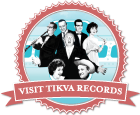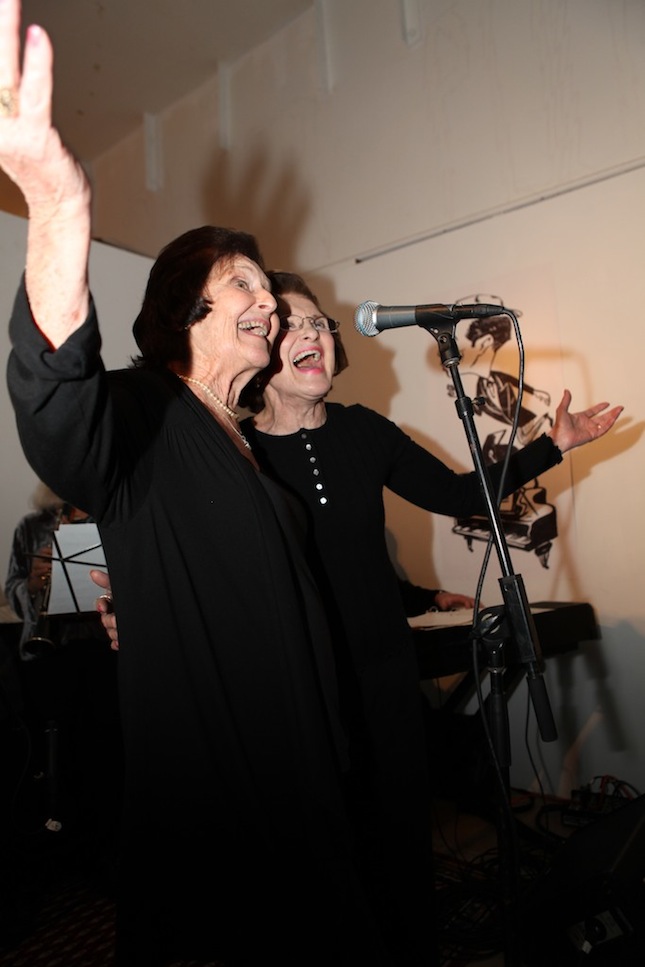Reminiscing with the Burton Sisters
-
When the Idelsohn Society opened Tikva Records on December 1, the store turned a tiny slice of San Francisco’s Outer Mission into a 1950s-style vinyl record shop. When the Burton Sisters reunited last night on stage at Tikva, the neighborhood was transformed briefly into the Catskills
Roger Bennett, one of Idelsohn’s founders, summed up the Burton Sisters to the crowd: “It is impossible to hear that music and not miss somebody. That is beauty of this act. You listen to that music, and you miss somebody.”
In advance of the show, one half of the Burton Sisters (born the Goldman sisters), Rose, calling from Florida, and generously recounted some of their colorful history, which we’ll share here:
On Show-Biz Chutzpah: I was born in Philadelphia, and my sister, Lynn, is two years younger. I finished high school before her. I knew we were going to go into show business. During the war we did USO in Philadelphia, and we ended up — oh, this is a funny story. I knew I had to get a job before my sister graduated. I saw an ad in the Inquirer in Philadelphia: a billing clerk at MGM. And I said, well, that sounds good — it sounded very theatrical. This was a distributor in Philadelphia. I went to an academic school. I couldn’t type, I couldn’t take shorthand, nothing, but I knew I had to work, so I got the job — and what I did to that company; it was a disaster. I can’t type, and I’m going to do billing? Everyone at MGM knew I didn’t know anything, but they helped me. The president’s secretary [went on maternity leave] and I took over her job: the secretary to the president of the company. I faked it. One day, my boss said, “Why don’t you have lunch with us. Dudley Wilkinson, a talent scout for MGM, is coming here, and we’re taking him for lunch.” I sat there and I had no idea what this is about. I said to him, “Mr. Wilkinson, you have a problem.” And he said, “Why, Rose?” And I said, “Because you are going all around the country looking for talent, and right here is the Gordon Sisters.” OK, that was our name before [we became the Burton Sisters]. “We’re very talented. Why don’t you give us a screen test.” And he started to laugh: “This kid has chutzpah.” My sister had just gotten out of high school. I got a letter a month later: “You have a screen test in New York.”
On Old-School Contract Negotiations: This is a typical Hollywood scene. He had his feet on his desk, he was smoking a cigar, and he said, “Kids, how much experience have you had? I said, “A lot.” Please, two nice Jewish kids. He said, “You have no experience. This is the proposition: I’ll take you. You can go out to California. I’ll pay you both of you seven fifty a week for seven years, and we own you.” “What’s the alternative,” I asked. “Go around the country, work the clubs, and come back to me in two years.” I stood up and I put my hands on my hips and said, “Nobody owns us.”
On Where “Burton” Comes From: The pianist who played for us happened to be with this agency. He was shocked knowing we’d been offered the contract and didn’t want to do it, so he brought us to his agency. He said, “These kids are great. They just refused a contract from MGM.” They had an opening in Fall River, Massachusetts: “Would you like to play two weeks?” We had no music, no gowns, absolutely nothing. I said, “Of course.” I signed the contract. My mother wouldn’t let us go by ourselves, so my older sister came with us. My older sister, who went by Gordon, was in show business — she worked many of the clubs. So, we took the name the Gordon Sisters. When we were working the Borscht Belt — everyone did the Borscht Belt — the manager with one of the other acts came to us and said, “I’d like to manage you kids. Gordon Sisters isn’t a good name for you.” He had on his desk a bottle of Gallagher and Burton, the whiskey. And he said, “OK, you’re the Burton Sisters.” We could have been the Gallagher Sisters!
On the Yiddish Theater: Our mentor wanted us to do Yiddish Theater. He introduced us to all the Yiddish stars, so we went on the road with a show. We had no idea. We didn’t have lyrics, didn’t know what to say. The Yiddish Theater was amazing. It was all improvisation. They never gave you a script. I asked, “What are we going to do?” I was told, “I’m your father. I’m dying. Cry and speak in Yiddish.” What did we know? It was seat-of-our-pants. We ended up going with the show to L.A., with Mickey Katz — half Yiddish, half English.
On the Centrality of Yiddish: People have a love for Yiddish — that is the soul of our people. Yiddish was spoken in our house because our mother was from the Ukraine and didn’t speak English. My father was born in the United States, and they had to teach each other English and Yiddish. We started very young. Our father had a love of music, and we did everything from bar mitzvahs to lodge meetings. We sang in English and Yiddish. We were singing with my mother and father Yiddish folk songs. It was part of our upbringing. We come from an Orthodox family, and of course on a Friday night the lights are off — it was that Orthodox. My grandfather was a rabbi. And what do we do? We just sang.
Check out the calendar of all the events occurring at Tikva Records in San Francisco throughout the month of December.
Above photos of the Burton Sisters and their admiring crowd last night at Tikva Records by Justin Halgren (justinhalgren.com).




